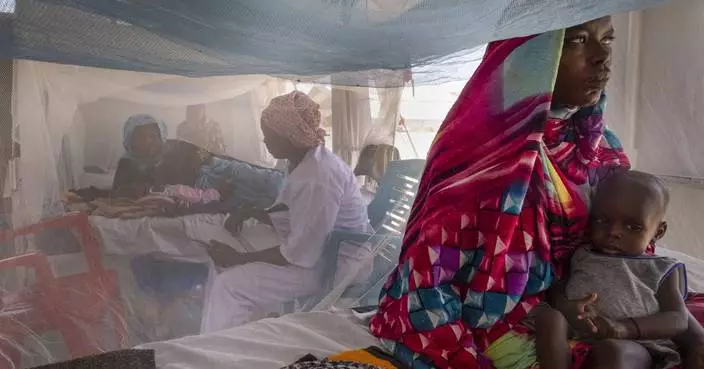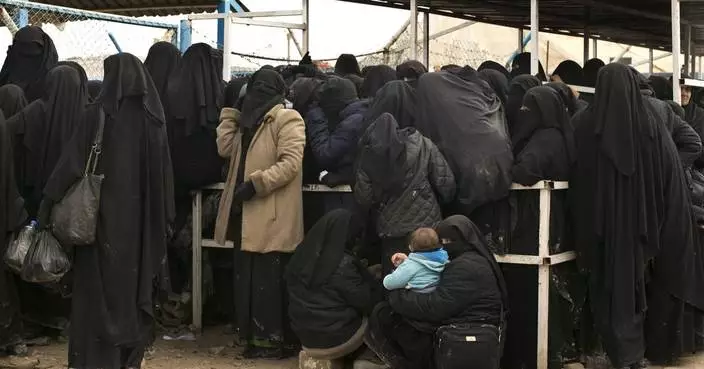Inspectors from the global chemical weapons watchdog made a second visit Wednesday to a Syrian town hit by an alleged chemical attack, collecting samples from a new location that will be sent to designated labs for analysis.
The suspected poison gas attack in Douma on April 7 has sparked an ongoing clash of narratives between the West and the governments of Syria and its key ally, Russia. Damascus and Moscow insist there was no chemical weapons attack.
Click to Gallery
Inspectors from the global chemical weapons watchdog made a second visit Wednesday to a Syrian town hit by an alleged chemical attack, collecting samples from a new location that will be sent to designated labs for analysis.
A Syrian filmmaker accused Russian state media of using images from the set of his 2016 movie to claim that the attack was staged by the West.
Fragments of US "tomahawk" cruise missiles captured by Syrian forces in recent attack, are displayed at a briefing in the Russian Defense Ministry in Moscow, Russia, Wednesday, April 25, 2018. (AP Photo/Alexander Zemlianichenko)
Syria's government and Russia have denied responsibility for the chemical attack. They have repeatedly blamed the rebels and opposition activists for possessing and deploying chemical weapons.
Syrian Ambassador to the United Nations Bashar Ja'afari, second from right listens as Assistant Secretary-General for Humanitarian Affairs and Deputy Emergency Relief Coordinator Ursula Mueller speaks during a Security Council meeting on the situation in Syria, Wednesday, April 25, 2018 at United Nations headquarters. (AP Photo/Mary Altaffer)
The inspectors' visit to Douma and sample collection would allow the OPCW to proceed with an independent investigation to determine what chemicals, if any, were used.
Qatari Foreign Minister Sheikh Mohammed bin Abdulrahman Al Thani, second left, speaks with European Union foreign policy chief Federica Mogherini, second right, during a meeting on the sidelines of a conference on 'Supporting the future of Syria and the region' at the EU Council building in Brussels, Wednesday, April 25, 2018. (Stephanie Lecocq, Pool Photo via AP)
He says Sunday's reports by Russia's Rossiya-1 and Channel One showed behind-the-scenes images from the set of his short film, "Kimawi," Arabic for "chemical," as it was being shot in the eastern Ghouta region in September 2016.
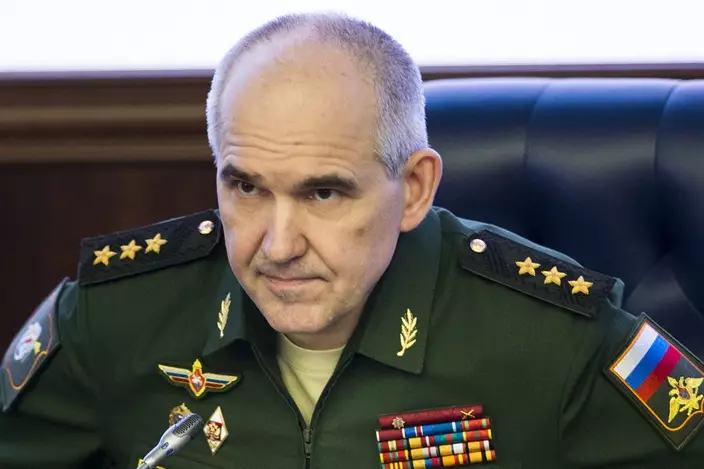
Col. Gen. Sergei Rudskoi of the military's General Staff speaks during a briefing in the Russian Defense Ministry in Moscow, Russia, Wednesday, April 25, 2018. Rudskoi said in a statement on Wednesday that Russia will supply Syria with "the new missile defense systems soon." (AP Photo/Alexander Zemlianichenko)
A Syrian filmmaker accused Russian state media of using images from the set of his 2016 movie to claim that the attack was staged by the West.
"I think it's a desperate and cheap attempt by Russian TV to deny the obvious attack of Douma," said Humam Husari, speaking of the images that appeared Sunday on two Russian state-run channels.
Opposition activists and first responders who witnessed the attack in Douma, which was under rebel control at the time, say it was carried out by government forces and killed more than 40 people, many of them suffocating in an underground shelter where they were hiding from government airstrikes. The U.S., France and Britain also blamed the Syrian government and launched joint punitive airstrikes targeting suspected Syrian chemical weapons facilities on April 14.
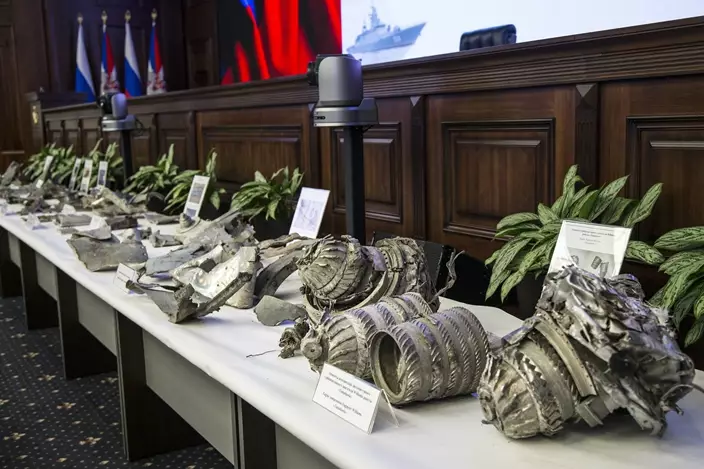
Fragments of US "tomahawk" cruise missiles captured by Syrian forces in a recent attack, are displayed at a briefing in the Russian Defense Ministry in Moscow, Russia, Wednesday, April 25, 2018. The Russian military has indicated it will supply the Syrian government with a sophisticated air defense system, after condemning a missile attack launched by the U.S., Britain and France earlier this month. (AP Photo/Alexander Zemlianichenko)
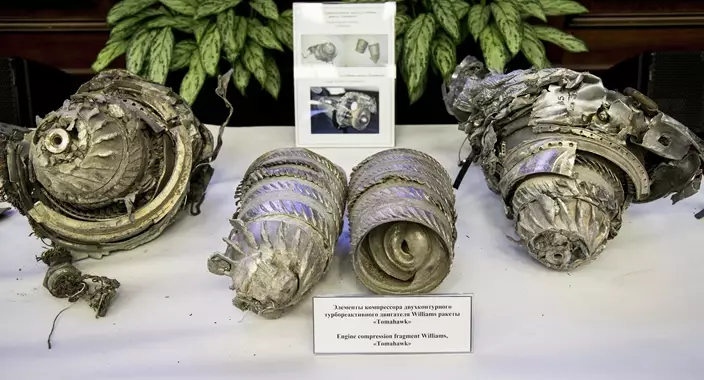
Fragments of US "tomahawk" cruise missiles captured by Syrian forces in recent attack, are displayed at a briefing in the Russian Defense Ministry in Moscow, Russia, Wednesday, April 25, 2018. (AP Photo/Alexander Zemlianichenko)
Syria's government and Russia have denied responsibility for the chemical attack. They have repeatedly blamed the rebels and opposition activists for possessing and deploying chemical weapons.
Russia had even said the attack was staged. On Wednesday, Russian diplomats said they plan to bring evidence of this to the Organization of the Prohibition of Chemical Weapons. Russian Embassy spokesman Mikhail Sobolev said it would bring a group of 15 Syrians who they claim were filmed in "staged videos" of the alleged attack to a meeting at the OPCW on Thursday.
Russia's Defense Ministry has also accused Britain of direct involvement in staging video images of alleged victims. Britain vehemently denied the accusation.
The OPCW said samples collected by its team in Douma will be sent to its labs for analysis. An earlier visit took place Saturday after the inspectors were delayed for days from getting to the town, just east of Damascus, for security reasons.
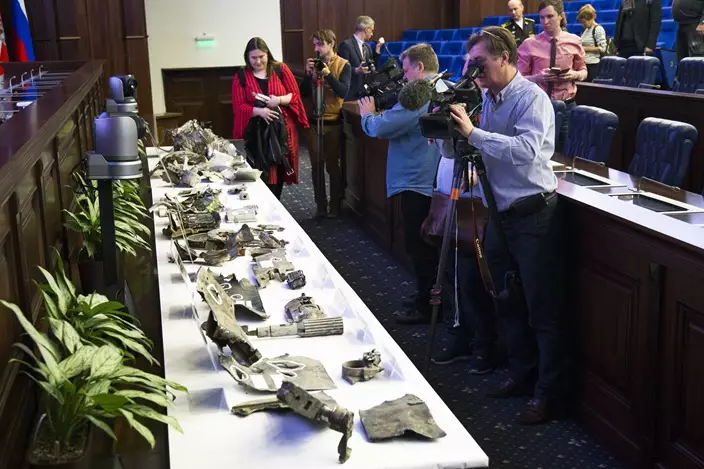
Fragments of US "tomahawk" cruise missiles captured by Syrian forces in recent attack, are displayed for journalists at a briefing in the Russian Defense Ministry in Moscow, Russia, Wednesday, April 25, 2018. (AP Photo/Alexander Zemlianichenko)
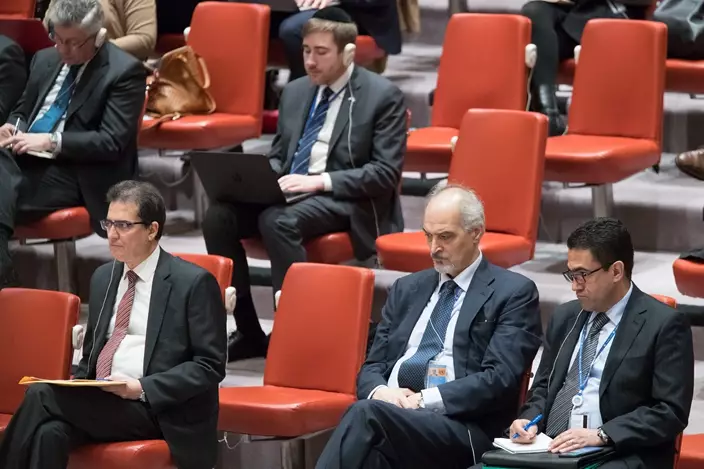
Syrian Ambassador to the United Nations Bashar Ja'afari, second from right listens as Assistant Secretary-General for Humanitarian Affairs and Deputy Emergency Relief Coordinator Ursula Mueller speaks during a Security Council meeting on the situation in Syria, Wednesday, April 25, 2018 at United Nations headquarters. (AP Photo/Mary Altaffer)
The inspectors' visit to Douma and sample collection would allow the OPCW to proceed with an independent investigation to determine what chemicals, if any, were used.
However, the OPCW is not mandated to fix blame for the attack. The mandate of a joint U.N.-OPCW body delegated to investigate such attacks has expired and Russia has vetoed its renewal. The joint body had found the Syrian government responsible for several previous attacks.
Husari, the Syrian filmmaker, denounced the use by Russian state-media of images from the set of his movie to push Moscow's narrative that video showing the aftermath of the April 7 attack was faked.
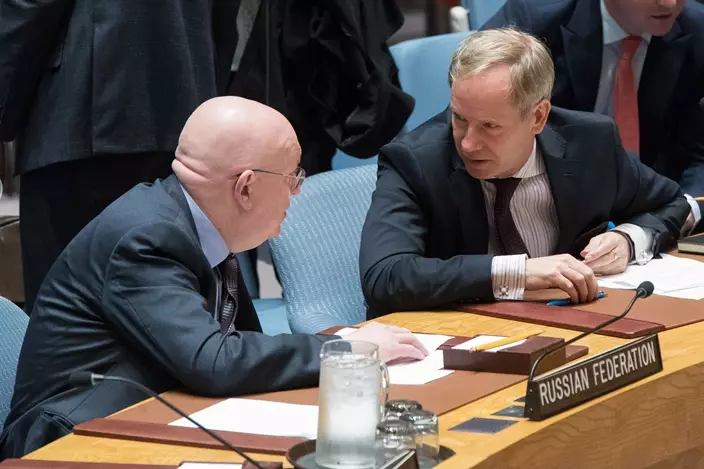
Russian Ambassador to the United Nations Vassily Nebenzia, left, speaks to Swedish Ambassador to the United Nations Olof Skoog after a Security Council meeting on the situation in Syria, Wednesday, April 25, 2018 at United Nations headquarters. (AP Photo/Mary Altaffer)

Qatari Foreign Minister Sheikh Mohammed bin Abdulrahman Al Thani, second left, speaks with European Union foreign policy chief Federica Mogherini, second right, during a meeting on the sidelines of a conference on 'Supporting the future of Syria and the region' at the EU Council building in Brussels, Wednesday, April 25, 2018. (Stephanie Lecocq, Pool Photo via AP)
He says Sunday's reports by Russia's Rossiya-1 and Channel One showed behind-the-scenes images from the set of his short film, "Kimawi," Arabic for "chemical," as it was being shot in the eastern Ghouta region in September 2016.
A segment on Rossiya-1 also shows an interview with Fares Muhammad Mayasa, identified as a former Army of Islam opposition fighter in Douma, who assisted on a film made by a Syrian director.
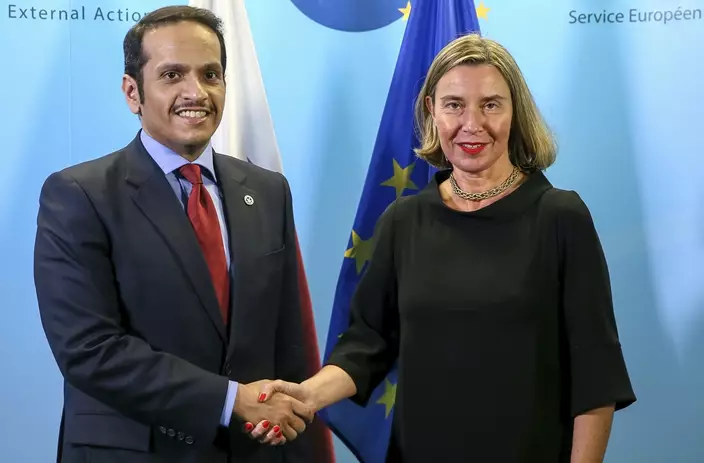
Qatari Foreign Minister Sheikh Mohammed bin Abdulrahman Al Thani is greeted by European Union foreign policy chief Federica Mogherini prior to a meeting on the sidelines of a conference on 'Supporting the future of Syria and the region' at the EU Council building in Brussels, Wednesday, April 25, 2018. (Stephanie Lecocq, Pool Photo via AP)
Husari told The Associated Press on Wednesday that Mayasa was involved in the production of the movie and was detained by security forces days after the attack, when the Douma rebels surrendered the town to Russian military police. He says some of the images from the set of the movie were probably found by security forces on his phone.
Thousands of Douma residents left the town after the attack while Russian military police and Syrian security forces deployed in the town, raising criticism from opposition activists that evidence may be tampered with.
Others have said that Douma residents who stayed in town under government control would be too afraid to challenge the Russian and Syrian narrative, fearing persecution.
Responding to Russian plans to visit its headquarters in The Hague with the Syrians, the OPCW said it has advised the Russian delegation that "these persons should be first interviewed" by the inspectors who are in Damascus.
"It was also recommended that such a briefing take place once the (fact-finding team) has completed its work," the statement said. "Nevertheless, the Russian delegation stated that it would go ahead with the briefing and that its intention was not to interfere" with the work of the mission currently in Syria."
The suspected attack and retaliation increased tension between the West and Russia.
On Wednesday, Russian Col. Gen. Sergei Rudskoi said Moscow will supply Syria with "new missile defense systems soon." His statement did not specify the weapons, but the remarks follow Russian media reports that Moscow is considering selling its S-300 surface-to-air missile systems to Syria.
Top officials in Russia said it might reconsider its pledge a decade ago not to provide Syria with the S-300 system.
Transferring upgraded air-defense systems to Syria could be seen as an escalation by neighboring Israel, raising the risk of Israeli attacks.
Israeli Defense Minister Avigdor Lieberman said Tuesday if Syria uses Russian-made air defense missiles against Israel, the Israeli military would strike back.
"What's important to us is that the defensive weapons the Russians are giving Syria won't be used against us," Lieberman told Israeli news website Ynet. "If they're used against us, we'll act against them."
Israel has not taken sides in Syria's civil war, but its air force has carried out dozens of airstrikes, most believed to have been aimed at suspected arms shipments to the militant Lebanese group Hezbollah, another key ally of Syrian President Bashar Assad. Israel also has warned that it will not accept a permanent military presence in Syria by Iran, also a staunch Assad supporter.
In Brussels, international donors on Wednesday pledged an estimated $4.4 billion in humanitarian aid for Syria and neighbors sheltering its refugees in 2018, falling well short of the more than $7 billion the U.N. is seeking.
An estimated 450,000 people have been killed in fighting in Syria since Assad's government cracked down on demonstrations calling for his ouster in 2011.
Eight years into the conflict, more than 13 million Syrians are in need of humanitarian assistance; about a quarter of the population is displaced in neighboring Lebanon, Jordan and Turkey, according to the U.N.
U.N. humanitarian chief Mark Lowcock described the pledges as a "good start" and said he expected the amount to grow. Still, he said that given the funds available, the organization would have to save it for the most desperate cases.
With fighting still raging and the northern rebel-held province of Idlib in danger of becoming a new crisis zone, EU foreign policy chief Federica Mogherini urged Russia, Iran and Turkey to use their influence in Damascus, saying they have a "special responsibility" to establish a cease-fire and to press Assad to return to the negotiating table.
"We are seeing an escalation in military activities, which is exactly the contrary" to what they promised, Mogherini said.
WASHINGTON (AP) — The Pentagon could get weapons moving to Ukraine within days once Congress passes a long-delayed aid bill. That's because it has a network of storage sites in the U.S. and Europe that already hold the ammunition and air defense components that Kyiv desperately needs.
Moving fast is critical, CIA Director Bill Burns said this past week, warning that without additional aid from the U.S., Ukraine could lose the war to Russia by the end of this year.
“We would like very much to be able to rush the security assistance in the volumes we think they need to be able to be successful,” Pentagon press secretary Maj. Gen. Pat Ryder said.
The House approved $61 billion in funding for the war-torn country Saturday after Speaker Mike Johnson, R-La., pushed a larger foreign aid bill toward a vote despite threats from within his party that doing so could cost him his job. It still needs to clear the Senate.
After the House vote, Ukraine's president, Volodymyr Zelenskyy, said he was grateful “for the decision that keeps history on the right track.” He said on X, formerly Twitter that the House action “will keep the war from expanding, save thousands and thousands of lives, and help both of our nations to become stronger.”
President Joe Biden has said he would sign it “immediately.”
If that happens, “we have a very robust logistics network that enables us to move material very quickly,” Ryder told reporters this past week. “We can move within days.”
The Pentagon has had supplies ready to go for months but hasn’t moved them because it is out of money. It has already spent all of the funding Congress had previously provided to support Ukraine, sending more than $44 billion worth of weapons, maintenance, training and spare parts since Russia’s February 2022 invasion.
By December, the Pentagon was $10 billion in the hole, because it is going to cost more now to replace the systems it sent to the battlefield in Ukraine.
As a result, the Pentagon’s frequent aid packages for Ukraine dried up because there’s been no guarantee Congress would pass the additional funding needed to replenish the weapons the U.S. has been sending to Ukraine. The legislation would include more than $20 billion to restock the Pentagon's shelves and ensure that the military services have what they need to fight and protect America.
The lag in weapons deliveries has forced Ukrainian troops to spend months rationing their dwindling supply of munitions.
A look at how the U.S. can quickly move weapons to Ukraine:
When an aid package for Ukraine is announced, the weapons are either provided through presidential drawdown authority, which allows the military to immediately pull from its stockpiles, or through security assistance, which funds longer-term contracts with the defense industry to obtain the systems.
The presidential drawdown authority, or PDA, as it’s known, has allowed the military to send billions of dollars worth of ammunition, air defense missile launchers, tanks, vehicles and other equipment to Ukraine.
“In the past, we’ve seen weapons transferred via presidential drawdown authority arrive within a matter of days,” said Brad Bowman, director at the Foundation for the Defense of Democracies center on military and political power.
Those stocks are pulled from bases or storage facilities in the U.S. or from European sites where the U.S. has already surged weapons to cut down on the amount of time it will take to deliver them once the funding is approved.
As the war in Ukraine has dragged on, the U.S. began to send increasingly larger, more lethal and more expensive systems to the warfront. They included entire air defense systems, armored vehicles, sophisticated missiles — even Abrams tanks.
Those systems cost more to replace, so the military — in particular, the Army — went deeper into debt. Compounding that, the military in some cases opted to replace older systems sent to Ukraine with pricier, higher-tech ones at home.
As a result, Army leaders recently told Congress that without passage of the foreign aid bill, they will begin to run out of money and have to move funds from other accounts.
Army Secretary Christine Wormuth and Gen. Randy George, chief of staff of the Army, said the branch wouldn’t have enough money to bring home troops serving in Europe or to train units in the U.S.
The military has massive weapons storage facilities in the U.S. for millions of rounds of munitions of all sizes that would be ready to use in case of war.
For example, the McAlester Army Ammunition Plant in Oklahoma sprawls across 45,000 acres (70 square miles) connected by rail and has a mission to surge as many as 435 shipping containers — each able to carry 15 tons (30,000 pounds) worth of munitions — if ordered by the president.
The facility is also a major storage site for one of the most used munitions on Ukraine’s battlefield, 155 mm howitzer rounds.
The demand by Ukraine for that particular shell has put pressure on U.S. stockpiles and pushed the military to see where else it could get them. As a result, tens of thousands of 155 mm rounds have been shipped back from South Korea to McAlester to be retrofitted for Ukraine.
According to a U.S. military official, the U.S. would be able to send certain munitions “almost immediately” to Ukraine because storehouses exist in Europe.
Among the weapons that could go very quickly are the 155 mm rounds and other artillery, along with some air defense munitions. The official spoke on the condition of anonymity to discuss preparations not yet made public.
A host of sites across Germany, Poland and other European allies also are helping Ukraine maintain and train on systems sent to the front. For example, Germany set up a maintenance hub for Kyiv’s Leopard 2 tank fleet in Poland, near the Ukrainian border.
The nearby maintenance hubs hasten the turnaround time to get needed repairs done on the Western systems.
Follow the AP's coverage of Russia's war in Ukraine at https://apnews.com/hub/russia-ukraine.
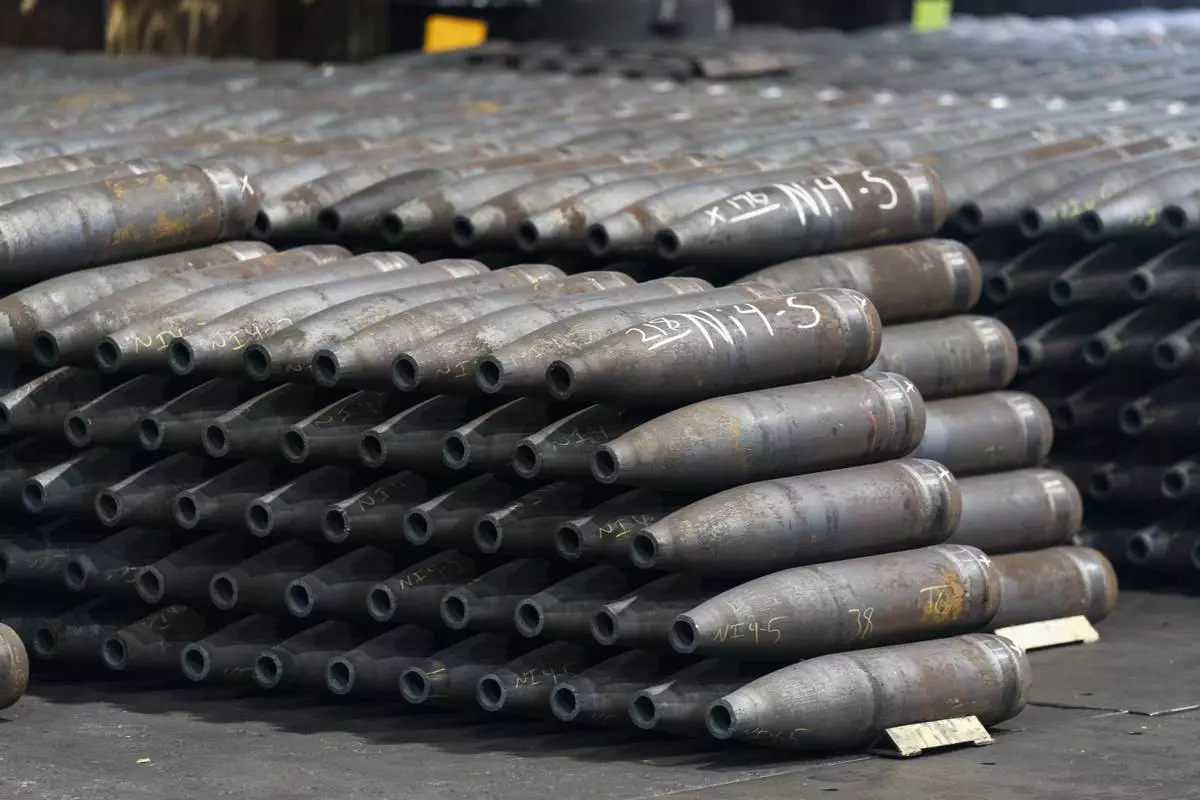
FILE -155 mm M795 artillery projectiles are stacked during manufacturing process at the Scranton Army Ammunition Plant in Scranton, Pa., Thursday, April 13, 2023. The Pentagon could get weapons moving to Ukraine within days if Congress passes a long-delayed aid bill. That's because it has a network of storage sites in the U.S. and Europe that already hold the ammunition and air defense components that Kyiv desperately needs. Moving fast is critical, CIA Director Bill Burns said Thursday, April 18, 2024. (AP Photo/Matt Rourke, File)
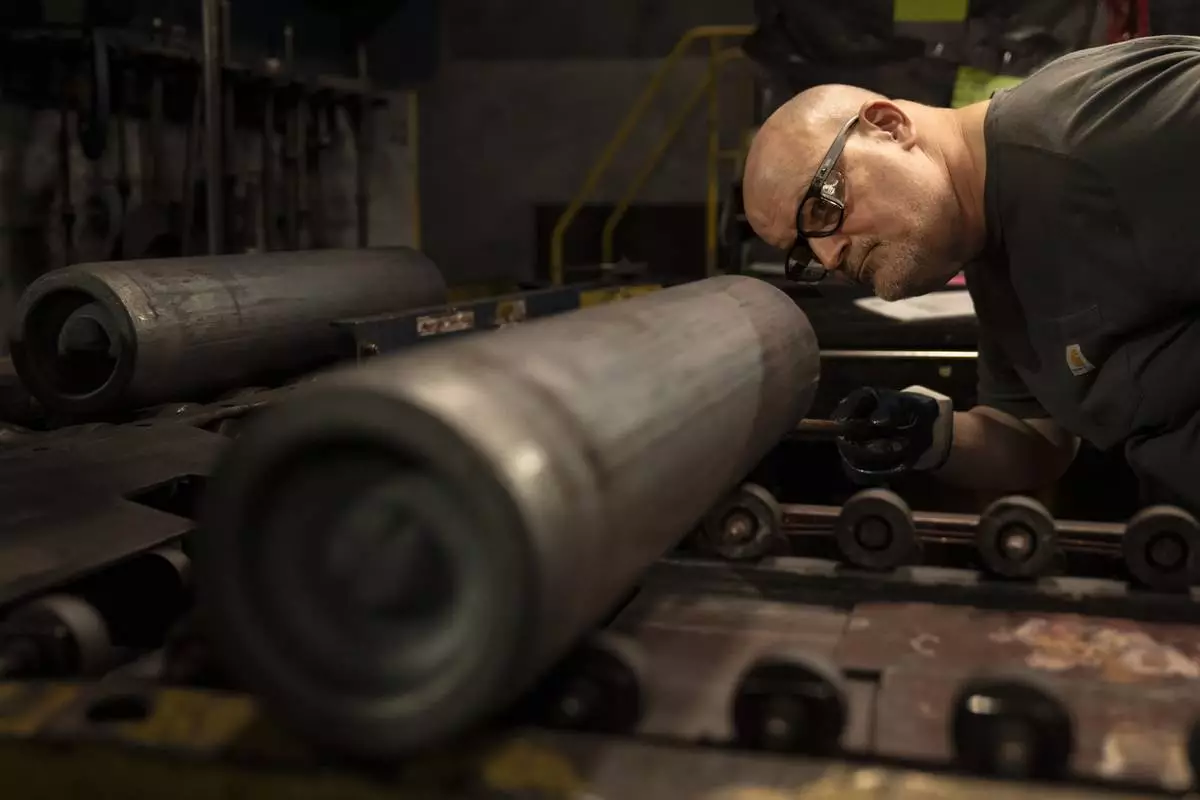
FILE -A steel worker inspects a 155 mm M795 artillery projectile during the manufacturing process at the Scranton Army Ammunition Plant in Scranton, Pa., Thursday, April 13, 2023. The Pentagon could get weapons moving to Ukraine within days if Congress passes a long-delayed aid bill. That's because it has a network of storage sites in the U.S. and Europe that already hold the ammunition and air defense components that Kyiv desperately needs. Moving fast is critical, CIA Director Bill Burns said Thursday, April 18, 2024. (AP Photo/Matt Rourke, File)
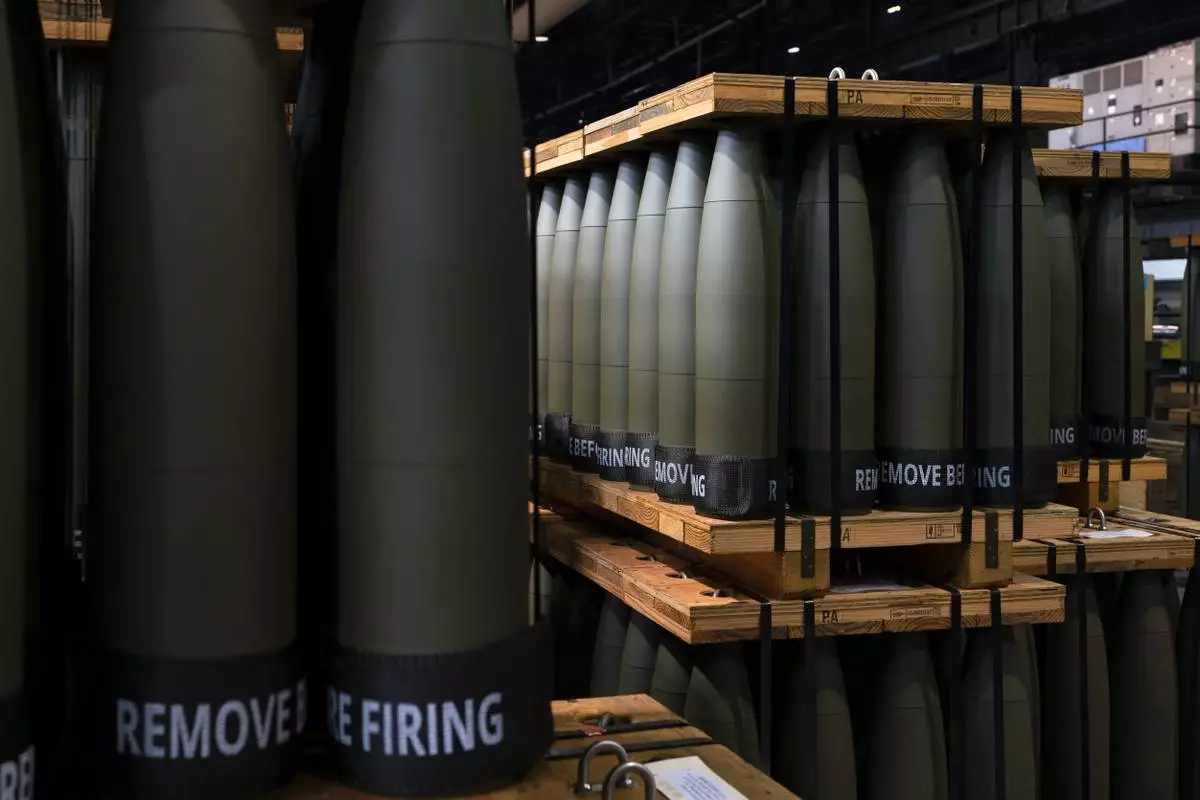
FILE -155 mm M795 artillery projectiles are stored for shipping to other facilities to complete the manufacturing process at the Scranton Army Ammunition Plant in Scranton, Pa., Thursday, April 13, 2023. The Pentagon could get weapons moving to Ukraine within days if Congress passes a long-delayed aid bill. That's because it has a network of storage sites in the U.S. and Europe that already hold the ammunition and air defense components that Kyiv desperately needs. Moving fast is critical, CIA Director Bill Burns said Thursday, April 18, 2024. (AP Photo/Matt Rourke, File)
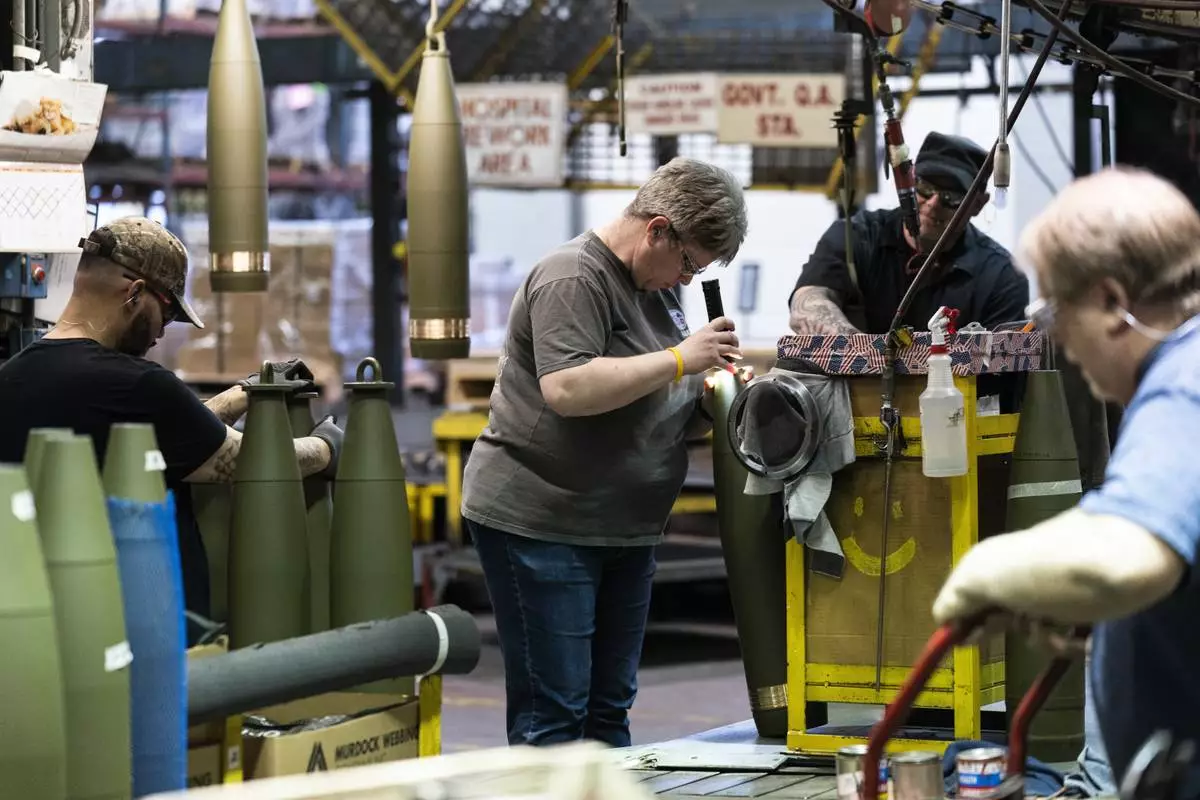
FILE -Steel workers manufacture 155 mm M795 artillery projectiles at the Scranton Army Ammunition Plant in Scranton, Pa., Thursday, April 13, 2023. The Pentagon could get weapons moving to Ukraine within days if Congress passes a long-delayed aid bill. That's because it has a network of storage sites in the U.S. and Europe that already hold the ammunition and air defense components that Kyiv desperately needs. Moving fast is critical, CIA Director Bill Burns said Thursday, April 18, 2024. (AP Photo/Matt Rourke, File)
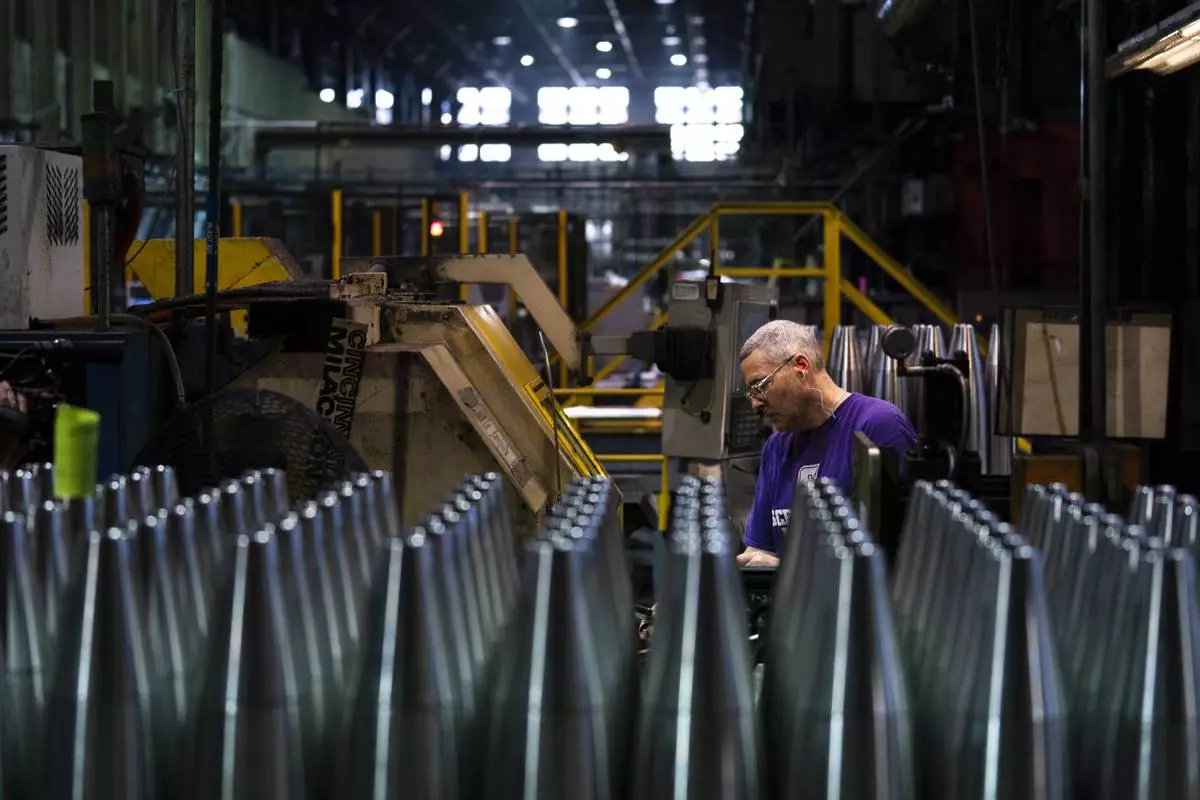
FILE -A steel worker manufactures 155 mm M795 artillery projectiles at the Scranton Army Ammunition Plant in Scranton, Pa., Thursday, April 13, 2023. The Pentagon could get weapons moving to Ukraine within days if Congress passes a long-delayed aid bill. That's because it has a network of storage sites in the U.S. and Europe that already hold the ammunition and air defense components that Kyiv desperately needs. Moving fast is critical, CIA Director Bill Burns said Thursday, April 18, 2024. (AP Photo/Matt Rourke, File)
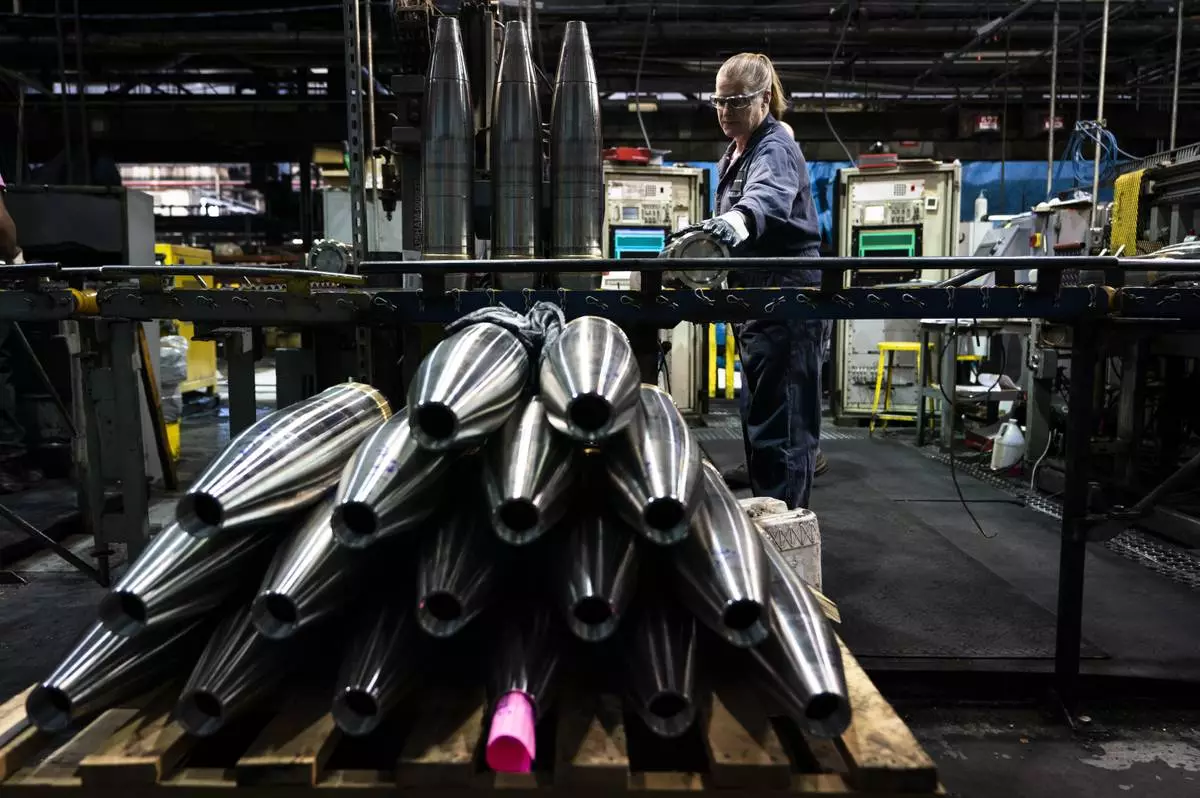
FILE -A steel worker moves a 155 mm M795 artillery projectile during the manufacturing process at the Scranton Army Ammunition Plant in Scranton, Pa., Thursday, April 13, 2023. The Pentagon could get weapons moving to Ukraine within days if Congress passes a long-delayed aid bill. That's because it has a network of storage sites in the U.S. and Europe that already hold the ammunition and air defense components that Kyiv desperately needs. Moving fast is critical, CIA Director Bill Burns said Thursday, April 18, 2024. (AP Photo/Matt Rourke, File)

















